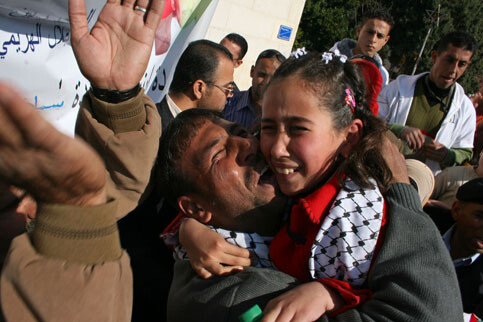
Jalal al-Hremy hugs his 10-year-old daughter Samaher after the two were reunited after Samaher was denied entry to Bethlehem because she was registered with her deceased grandmother’s ID, Bethlehem, 26 December 2007. (Luay Sababa/MaanImages)
A few months ago, a European professional in Ramallah threw a farewell party after completing part of the project for which he was recruited. The European himself, a Belgian, spent many years previously in the Palestinian territories and was very well liked locally, not least because he married a Palestinian woman, but that’s another story.
A friend and old colleague of mine came up to me at the party and asked me discretely about A., a good-looking and outgoing woman who works with us: “What religion is she?” “Muslim, I said.” “Good,” he said. “What sort of ID does she hold?” I replied, “She is Palestinian with a Jordanian passport who overstayed here. Why?” “What a pity,” he said, “because a friend of mine, Y., who has just met and chatted with her likes her and wanted to find out.”
Such a question might seem odd elsewhere. But in Palestine it is very relevant.
There are tens of thousands of Palestinians with Jordanian or other foreign passports who are denied by the Israeli occupying army, or by the Israeli ministries of interior or labor, from residing in the Palestinian territories. Others are prevented from visiting or returning to the territories, although they have family, friends, business or studies, in a very arbitrary manner. The reason given by the Israeli authorities is often bitakhon, or security, without bothering to give any shred of justification. This has led many Palestinians, and even non-Palestinian wives and relatives, to overstay their Israeli permits for fear of not being allowed back. This was the case of A.
So many families in Palestine, and also in Israel, are separated by different passports. A Palestinian orange ID holder marrying a Palestinian with an Israeli nationality will not be allowed to live in Israel and the spouse with Israeli nationality will be not allowed to live in the Palestinian Authority areas. Even a Jerusalem blue ID holder marrying a West Banker will not be permitted to have her spouse live with her in Jerusalem. So the question of what ID is held by the subject of one’s fancy has to be asked before one falls in love with her or him.
This Israeli policy was met with resistance prompted by an active grassroots campaign and pressure from the governments of nationals denied entry or re-entry to the occupied Palestinian territories. Israeli overtures towards the Palestinian Authority in response included the granting of family unification to members of families torn apart by differing nationalities and IDs. A. was eventually among the lucky ones, but not all her family.
I have never seen A. so ecstatic as when her name appeared on the list of those to be allowed to apply for a Palestinian ID, itself issued by the Israeli occupying army. She immediately sent in her papers and a week later went to Jordan to see her sisters and relatives that she had not seen for close to ten years. She also found that there is more choice in shopping there than the confines of Ramallah which she was always afraid to leave lest she be caught at an Israeli army checkpoint.
A. came into my office this week, with a broad and telling smile, to say that her admirer Y., who stayed mostly away after the party, has turned up again to visit A., showing renewed interest. The rest might become history.
Ghassan Abdullah is a computer adviser in the West Bank city of Ramallah.
Related Links

